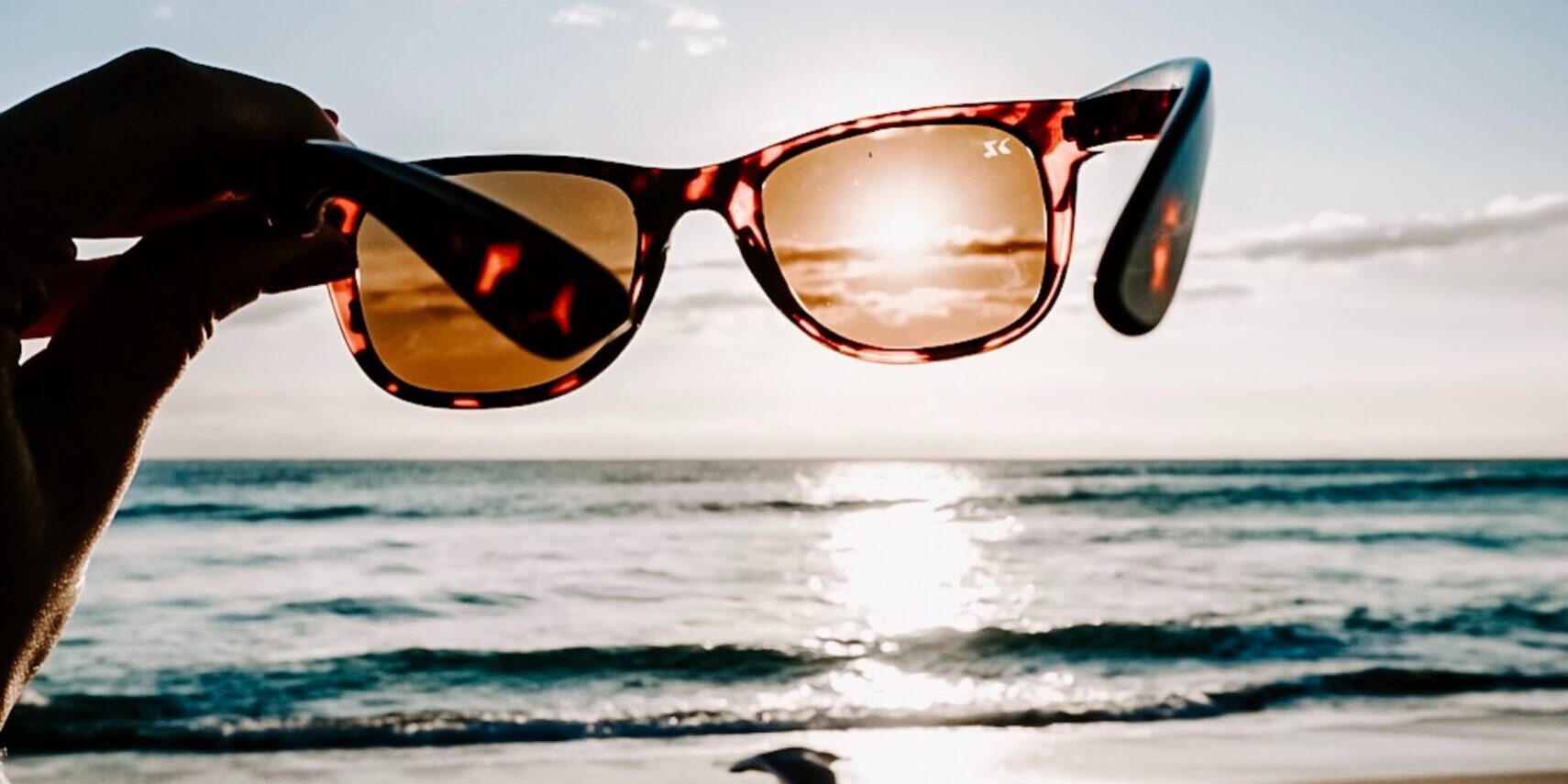When most people think about sunglasses, they think about style. But the real purpose of a great pair of shades? Protecting your eyes.
From harmful UV rays to glare and eye strain, your sunglasses play a critical role in long-term eye health. But with so many lens types, coatings, and marketing claims, it’s easy to get overwhelmed. So—which type of sunglasses are best for eye protection?
In this guide, we’ll break down everything you need to know about:
-
The best UV protection sunglasses
-
Sunglass UV ratings
-
What features matter (and what’s just hype)
-
How to choose the right pair—especially if you have sensitive eyes or a larger face
Let’s protect those eyes 👇
Why Eye Protection Matters
The sun’s UV rays don’t just affect your skin—they can seriously harm your eyes too. Unprotected exposure can contribute to:
-
Cataracts
-
Macular degeneration
-
Photokeratitis (sunburn of the eye)
-
Pterygium (growth on the eye)
Even on cloudy days, up to 80% of UV rays still reach your eyes. That’s why wearing UV-blocking sunglasses year-round is essential—not just for summer holidays.

What Are the Best Sunglasses to Protect from UV Rays?
✅ The best sunglasses for UV protection have:
-
UV400 lenses (blocks 100% of UVA and UVB rays)
-
Polarisation to reduce glare
-
Wraparound or large lenses to limit peripheral exposure
🕶 At Faded Days, every pair of sunglasses includes UV400 polarised lenses, regardless of price or style.
UV400 is the industry gold standard, filtering wavelengths up to 400 nanometres—including both UVA and UVB. If sunglasses don’t state “UV400,” you’re taking a risk.
UV Protection vs Polarisation: What’s the Difference?
These terms often get confused, so let’s break it down:
| Feature | What It Does | Do You Need It? |
|---|---|---|
| UV Protection | Blocks harmful UV rays from reaching your eyes | ✅ Essential |
| Polarisation | Filters horizontal light to reduce glare | ✅ Highly recommended (esp. for driving, water, snow) |
Polarised lenses don’t necessarily block UV light unless they’re also UV400-rated. At Faded Days, you get both in every lens.

1. UV400 Certified Lenses
This is non-negotiable. UV400 lenses block 100% of harmful UVA and UVB rays. Don’t settle for anything less.
2. Large Frame Coverage
More lens area = more protection. Choose frames that cover your eyes fully and limit light from entering at the sides.
3. Wraparound Styles
Ideal for sports and high-glare environments, wraparound sunglasses provide peripheral protection from UV rays, wind, and dust.
4. Polarised Coating
This filters horizontal glare from roads, water, and windows—reducing strain, improving visibility, and helping prevent squinting.
5. Anti-Reflective Coating
Some lenses reflect light from the back surface into your eyes. An anti-reflective coating reduces this, adding comfort and clarity.
Best Sunglasses for Sensitive Eyes
If your eyes are easily irritated by light, you’re not alone. Here’s what to look for:
✅ Polarised lenses – to reduce glare-induced squinting
✅ Darker tints – grey or brown work well
✅ Mirrored finishes – reflect additional light
✅ Wraparound designs – minimise light entry from the sides
Faded Days offers all of the above features, with multiple polarised mirrored lens options and frames that come in XL and XXL sizes for full comfort.

What Are the Best Sunglasses for Eye Protection?
If we’re being specific—the best sunglasses to protect eyes combine these four features:
-
UV400 protection
-
Polarisation
-
Large lens size or wraparound frame
-
Durable, optical-grade materials (to maintain clarity over time)
Every pair of Faded Days sunglasses is built with this in mind. Whether you’re choosing our Classic 165mm XXL, Sport 155mm XL, or Aviator 165mm XXL, you get UV400 polarised lenses that shield your eyes and reduce fatigue.
-
How Are Sunglasses Rated for Eye Protection?
There are two main systems:
1. UV Rating (UV400 is best)
This tells you how well the lenses block ultraviolet rays. You want full UVA + UVB protection like all Faded Days sunglasses.
2. Lens Category (0–4)
This indicates how dark the lenses are:
-
Category 0 – Clear or very light tint
-
Category 1–2 – Mild/moderate sunlight
-
Category 3 – Strong sunlight (✅ most Faded Days sunglasses)
-
Category 4 – Intense sunlight, not safe for driving
Tip: For everyday wear, driving, and sports, Category 3 UV400 polarised lenses offer the best all-around eye protection.
What Are the Best Women’s Sunglasses for Eye Protection?
It’s less about gender and more about features and fit. That said, many women prefer:
-
Larger lenses for style + protection
-
Mirrored finishes for privacy
-
Lighter frames that still offer UV400 + polarisation
Our Classic 145mm frames offer stylish wide-fit protection with full UV credentials—and suit a wide range of face shapes.

Highest UV Protection Sunglasses: What to Avoid
Unfortunately, not all sunglasses are created equal. Here’s what to watch out for:
🚫 No UV label – Avoid any pair that doesn’t list UV400 or 100% UV protection
🚫 Fashion-only sunglasses – Some cheaper styles skip real sun protection for the sake of looks
🚫 Tinted but unprotected lenses – These can be worse than wearing nothing, as your pupils dilate behind the darkness and absorb more UV.The Faded Days Difference: Full Protection, Fit That Works
Most brands focus on looks. We focus on fit, comfort, and performance—especially for people who’ve always struggled to find sunglasses that actually fit.
With Faded Days, you get:
-
UV400 polarised lenses in every pair
-
Multiple widths (145mm, 155mm, 165mm)
-
Premium build quality at a fair price
-
5-star comfort, based on real-world reviews
Whether you’re hiking, driving, hitting the beach, or just walking to the shop—you deserve protection that fits.
Final Thoughts: Best Sunglasses for Sun Protection?
To sum it up, the best sunglasses for eye protection offer:
-
✅ UV400 full-spectrum protection
-
✅ Polarised lenses to reduce glare
-
✅ Large lens coverage for full shield
-
✅ Durability, clarity, and comfort
Whether your eyes are sensitive, your head is big, or you’re just tired of low-quality shades—Faded Days delivers protection, performance, and fit that makes a difference.
👉 Shop sunglasses for eye protection or Take our Fitting Guide to find your perfect size.
-



Share:
The Pros and Cons of Mirrored Sunglasses for Large Heads
How to Choose the Best Sunglasses to Suit a Round Face Shape